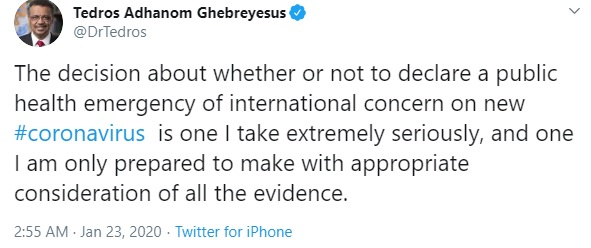The Coronavirus outbreak took place in December in the Chinese city of Wuhan in Hubei province. Earlier, the cases were concentrated in the city itself. However, it has now traveled beyond Wuhan and spread to other places in China. The SARS-like virus has spread to five other countries, and as far as the United States, where a Washington man took ill with the symptoms. In order to curb the spread further, the Chinese government has taken extraordinary steps and imposed restrictions in Wuhan at an unprecedented level.
What are the restrictions imposed?
The restrictions come ahead of the Chinese Lunar New Year holiday, which begins on Friday, where millions of people travel domestically and abroad. The 11 million residents of Wuhan have been ordered not to leave the city. They have also been instructed to avoid crowds and minimize public gatherings. Resorts and hotels have been asked to suspend large-scale activities, while libraries, museums, and theatres have canceled exhibitions and performances.

Wuhan city's Guiyuan Temple, which attracted 700,000 people during last year's Lunar New Year prayer, has been told to avoid that this year, BBC reported. Airports and railway stations in the city have also been closed. Local transport, which includes buses, subways have been halted for 1000 hours.
Is the coronavirus outbreak a "global emergency"?
World Health Organization (WHO) held a meeting on Wednesday in which it was decided that the coronavirus outbreak would not be declared a public health emergency of international concern. Director-General, Dr. Tedros Ghebreyesus, said that more information was needed about the spread of the infection.

The committee will meet again on Thursday to discuss the issue. A public health emergency of international concern is the highest level of alarm the WHO can sound and has previously been used in response to containing swine flu, Zika virus, and Ebola.

Coronavirus outbreak in Wuhan
Coronaviruses are a large family of viruses that can cause illness, ranging from the common cold to SARS (Severe Acute Respiratory Syndrome). 2002-03 SARS outbreak in China infected about 8,000 people in over 37 countries and claimed about 80 lives. The present outbreak is reported of being from a newly-identified type of coronavirus.
Wuhan virus, whose origin was traced to a now-closed local sea-food market, can spread from human-to-human, Chinese authorities confirmed on Monday.
571 people have been infected and 17 have lost their lives to the disease, according to China's National Health Commission, South China Morning Post reported. 4 in Thailand, 2 in Hong Kong and 1 each in Macau, Hong Kong, Japan, South Korea and United States, have been infected with the disease.









